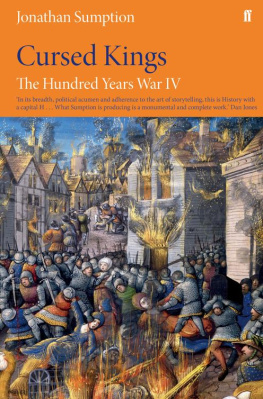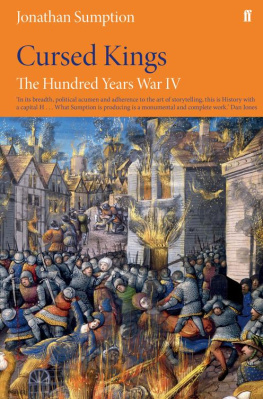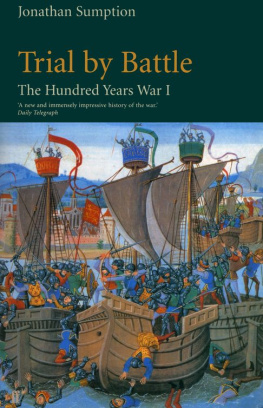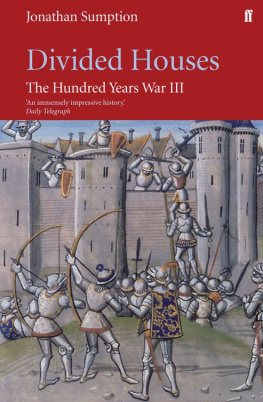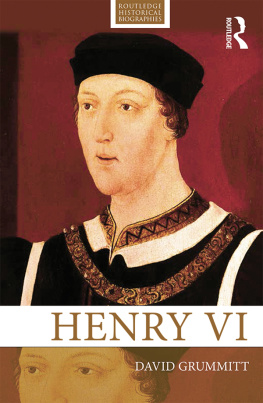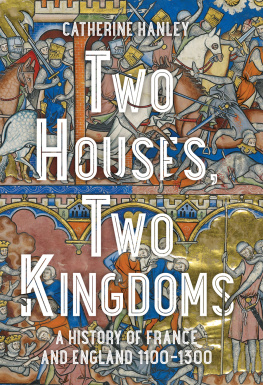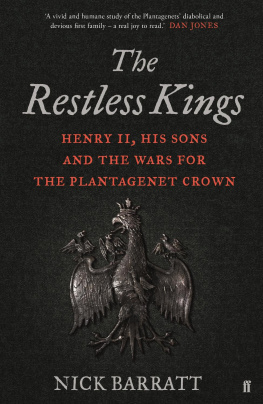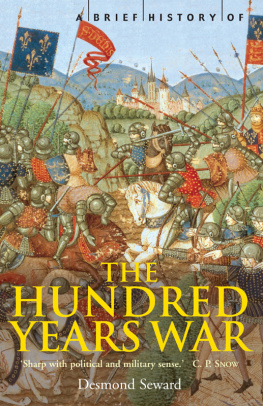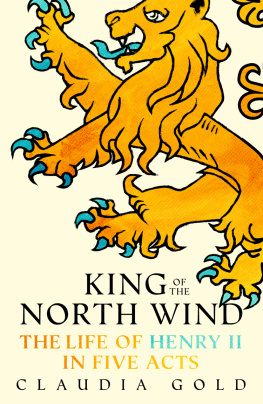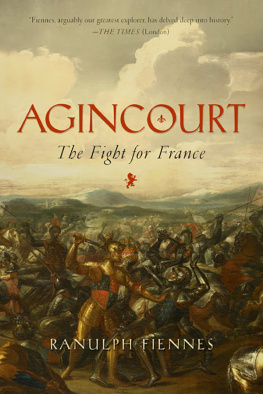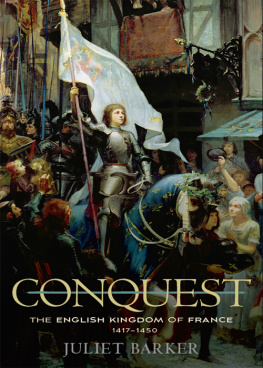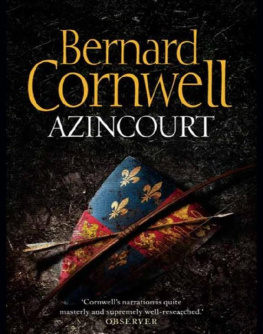In the early fifteenth century France, the strongest and most populous nation state of medieval Europe, suffered a complete internal collapse and a partial conquest by a foreign power, something for which there was no precedent in its earlier history, or indeed later until 1940. The history of these years is framed by two political murders. In November 1407 Louis Duke of Orlans, the Kings brother and the effective ruler of France, was battered to death in a Paris street by a band of killers hired by his cousin John the Fearless, Duke of Burgundy. Twelve years later, in September 1419, John was in turn cut down on the bridge of Montereau in a carefully planned operation authorised by the Dauphin of France and carried out by his closest associates, most of whom had been Louis protgs in his lifetime. These assassinations unleashed a civil war in France which lasted for a generation and for bitterness and savagery matched the religious wars of the late sixteenth century and the revolutions of 1789 and 1870. The catastrophe put France at the mercy of one of the most remarkable rulers of the medieval period, Henry V of England, who occupied first Normandy and then Paris and much of northern France. English readers have naturally seen Henrys victories through English eyes, but they were in reality a chapter in a French tragedy.
These extraordinary events are overlaid in both France and England by the enduring power of myth. In France they marked the birth of a new patriotism, the point of departure for some of the seminal national myths which continue to influence perceptions of the period to this day. In England later generations would look back on an age of brief but spectacular achievement as the measure of their own rulers failure. Even now it is difficult to think of Englands fifteenth-century history without the arresting imagery of Shakespeare, who transmitted his own idealised account of the period two centuries later to a country still uncertain of its place in the world.
The story is dominated by the life and death of the city of Paris, which attained the highest and lowest points of its medieval history in the period covered by this volume. It was in Paris that the French princes pursued their struggle for power around the inert figure of a witless king. It was in the old Palace, the Louvre, the Htel Saint-Pol and the Htel de Bourbon that some of the most significant diplomatic encounters occurred. It was the prisons of the Chtelet and the Conciergerie which witnessed the worst scenes of mass murder in Frances medieval history. It was in the streets and lanes of the crowded right-bank quarters and beneath the shadow of the Bastille Saint-Antoine that mob violence determined the fate of governments. And it was in Paris that an English king took control of the institutions of the French state, installing his soldiers in its barracks and his functionaries in its offices, thus fulfilling a dream which his forebears had never dared to take seriously.
The rituals of legitimacy and the outward forms of authority mattered in the middle ages, but few rulers of the period were equal to their great offices. Who were the cursed kings of this volumes subtitle? The saddest of them was undoubtedly the benign but mentally defective Charles VI of France, a mannequin of authority, at once indispensable and useless, whose powers were usurped by those around him for their own purposes. Almost as tragic a figure was his Bavarian queen, Isabelle, driven into politics to defend the interests of her sickly children, but outmanoeuvred by cleverer men her brother-in-law and supposed lover Louis Duke of Orlans, Louis murderer John the Fearless, and the rebarbative Gascon dictator Bernard Count of Armagnac. There were others: the inexperienced Dauphin Charles of Ponthieu, the future Charles VII, Isabelles last surviving son whom she finally renounced and disinherited; that naive romantic Sigismund of Luxembourg King of Germany, a powerless bankrupt with pretensions to reorder the state of Europe; the sometime paladin of European chivalry Henry IV, who had seized the throne of England in a ruthless coup but, weakened by sickness and racked by guilt, found himself only intermittently able to govern; the pathetic child-king James I of Scotland, captured at sea and held for nearly two decades in English prisons to serve as the pawn of his jailers. Even Henry V found himself carried forward by the current of events which he could not control, assuming a burden beyond the resources of his kingdom which none of his successors could sustain. He died of dysentery in a French royal fortress at the age of thirty-six, just two months before he would have become King of France.
Like previous volumes of this history, this is a narrative, within an analytical framework supplied by the great themes of the time: the rising democracy of the streets, the nascent forces of nationalism, the disintegration of traditional forms of authority, the invasion of a great nation by a smaller and poorer but better-organised neighbour. The narrative sources for the period are unusually rich and varied. The shrewd and opinionated Michel Pintoin, cantor of the royal abbey of Saint-Denis and official historiographer of the monarchy; the Picard nobleman Enguerrand de Monstrelet, who continued Froissarts great chronicle with a high level of accuracy but none of his models literary verve; the French herald Jean Le Fvre who watched the battle of Agincourt from the English camp; the anonymous Parisian clergyman who for more than four decades recorded in acerbic tones the life of the city as seen from the streets; the English soldier John Page, probably a humble archer, who wrote the story of the siege of Rouen in doggerel verse with an immediacy matched only by the private letters home that now survive in growing numbers: these men, and others like them, watched events as they unfolded, representing different poles of contemporary experience. I have made extensive use of them and other contemporary writers, but the present narrative is shaped mainly by the abundant records, published and unpublished, of the English and French governments and the rich archives of the Valois Dukes of Burgundy. In this and other respects, the principles on which this volume is written are the same as in previous volumes.
I am often asked how many volumes there will be. The answer is that the next one, which will carry the story to the effective end of the English presence in France in the 1450s, will be the last. Calais remained in English hands for a century after that, and the English kings continued to call themselves kings of France until 1802. A final chapter of that volume will trace this curious afterlife of Englands longest and most debilitating war.
This volume is dedicated to my eldest daughter, who was born in 1979, the year that I embarked upon this venture.
J. P. C. S.
Berbiguires
September 2014
On 3 June 1400 the Byzantine Emperor Manuel II Paleologus entered Paris. By the showy standards of contemporary state visits Manuel cut a sorry figure. Accompanied by fewer than sixty of his own attendants, speaking nothing but Greek, mounted on a borrowed white charger and dependent for his travelling expenses on his hosts, he had come to beg for money and troops in the hope of preserving his shrunken domains from the Ottoman Turks. Yet what Manuel lacked in power and wealth he more than made up by the prestige of his crown, a vestigial relic of the last empire to unite all Christendom under a single government. The rulers of France were determined to enjoy the reflected light and to show off the magnificence of their capital. Two thousand prominent citizens lined the road from the fortified bridge of Charenton east of the city by which the Emperor approached. The presidents and judges of the Parlement received him in a body by the roadside, wearing their robes of office and surrounded by 500 attendants. Three French cardinals came forward to meet him, each with his own impressive entourage. The King, Charles VI, then enjoying an interval of lucidity, waited in front of the Porte Saint-Antoine beneath the walls of the Bastille, accompanied by his family and councillors and surrounded by a dense crowd of noblemen and massed trumpeters and bandsmen.

